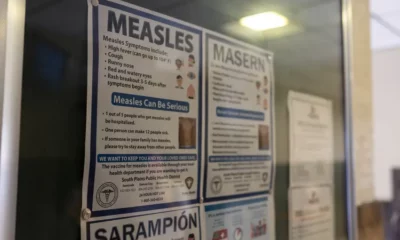News from the South - South Carolina News Feed
Shots fired hours after building fire at Haywood Mall
SUMMARY: Hours after a fire broke out in the vacant, under-construction old Sears building at Haywood Mall in Greenville, an altercation involving juveniles and a restaurant employee escalated to shots fired in the mall parking lot. Fortunately, no one was injured in either incident. Fire crews quickly extinguished the blaze, preventing damage to the occupied parts of the mall. Police located suspects and a firearm linked to the shooting. Despite the chaos, most shoppers were largely unaffected, and mall operations mostly returned to normal by evening. Witnesses described a frightening scene of gunfire and panic near the busy mall.
Shots fired hours after building fire at Haywood Mall
Subscribe to WYFF on YouTube now for more: http://bit.ly/1mUvbJX
Get more Greenville news: http://www.wyff4.com
Like us: http://www.facebook.com/WYFF4
Follow us: http://twitter.com/wyffnews4
Instagram: https://www.instagram.com/wyffnews4/
News from the South - South Carolina News Feed
Trump and Powell bicker over Fed building renovations as president ratchets up pressure campaign
SUMMARY: After months of criticizing Federal Reserve Chair Jerome Powell, President Donald Trump publicly challenged the rising costs of the Federal Reserve’s renovation project, claiming it would cost $3.1 billion versus the Fed’s $2.5 billion estimate. Powell disputed Trump’s figures, noting Trump included costs from a separate, already completed building. The renovation, budgeted at $1.9 billion in 2022, has increased due to higher security requirements, historic preservation, tariffs, and rising materials costs. The project includes modern security features and underground expansions, making it costly. Trump emphasized lowering interest rates to boost the economy but softened his stance on firing Powell.
The post Trump and Powell bicker over Fed building renovations as president ratchets up pressure campaign appeared first on www.abccolumbia.com
News from the South - South Carolina News Feed
Downtown revitalization project makes strides
SUMMARY: The Myrtle Beach downtown revitalization project is making significant progress with its new art and innovation district, a $22 million performing arts theater, and new shops. Focused on creating a vibrant, walkable community, the ongoing construction on Oak and Broadway streets is nearing completion, promising wider sidewalks, improved bike lanes, and better roads. Future phases include street realignments on 9th Avenue North and Broadway near City Hall. The project emphasizes community input through public meetings and aims to transform vacant areas into lively spaces, enhancing the city’s identity and making downtown a fun place to live, work, and play.
City officials said some of the construction downtown for the Myrtle Beach Downtown revitalization project is coming to an end soon.
The City of Myrtle Beach’s downtown master plan has been underway for years, with multiple projects still to finish. Through the projects, officials hoped to make downtown a fun and livable place for residents and tourists.
With the addition of a brand new Arts and Innovation District, $22 million performing arts theatre, and new shops for people to browse, downtown Myrtle Beach has changed its feel.
“We are really excited about it coming together. It’s a really interesting project, and I’m glad we are getting done with this phase to move onto the next one,” said the CEO of Myrtle Beach Downtown Alliance, Jason Greene.
Read more: https://wpde.com/news/local/downtown-myrtle-beach-construction-project-oak-street-broadway-end-date-arts-innovation-district
_______________
Stay up to date with our social media:
WPDE on Facebook: https://www.facebook.com/WPDEABC15/
WPDE on Twitter: https://twitter.com/wpdeabc15
Subscribe to WPDE on YouTube: https://www.youtube.com/channel/UCn0sxo5Ocp8eSFqr9F1URpg/?sub_confirmation=1
Daily News Playlist:
https://www.youtube.com/playlist?list=PLCFE982C7D59E70C1
For more information, visit https://wpde.com/
Have a news tip? Send it directly to us:
Email us: abc15news@wpde.com
Call the Newsroom: 843.487.3001
WPDE is a SC based station and an ABC Television affiliate owned and operated by Sinclair Broadcast Group. WWMB is a SC based station and a CW Television affiliate owned and operated by Howard Stirk Holdings and receives certain services from an affiliation of Sinclair Broadcast Group.
#WPDE #ABC15News #ABC15 #WPDE15 #MyrtleBeach
News from the South - North Carolina News Feed
Vetoed NC bills could be overridden. Democrat swing votes critical.
Four days after Gov. Josh Stein vetoed a bill that would prolong detention of suspected undocumented immigrants, it appeared on the House calendar for a veto override vote.
Hours later, after lawmakers debated and voted on dozens of other bills, House Bill 318 was the sole item remaining. The North Carolina state House adjourned without considering it.
[Subscribe for FREE to Carolina Public Press’ alerts and weekend roundup newsletters]
A few weeks later, the bill appeared on the calendar again; as before, it was eventually withdrawn from consideration.
House Speaker Destin Hall said onlookers should get used to this. Vetoed bills may linger on the day’s orders of business for a while, but from his perspective, it’s not a matter of whether lawmakers will override most of Stein’s vetoes — it’s a matter of when.
Override math on vetoed bills
The 2024 legislative elections handed North Carolina Democrats a small but significant victory in the state House. They now hold just enough seats to block Republicans from a supermajority, which would be able to override the governor’s vetoes without any Democratic support.
But the margins are slim. An absence or two could make all the difference. Several Democrats in swing districts voted for vetoed bills the first time around, and their support could be crucial in eventual veto override votes.
Rep. Charles Smith, D-Cumberland, originally voted against the majority of his party on three ultimately vetoed bills. Now, he has to decide whether to sustain Stein’s vetoes or override them.
He said that while Democratic leaders like the governor and House Minority Leader Robert Reives, D-Chatham, haven’t “held his feet to the fire,” he feels the pressure regardless.
“There is just pressure there inherently, if you’re standing on an island — not that I am by myself, but just being in that position,” Smith said.
Smith joins a small group of House Democrats in the spotlight. Rep. Shelly Willingham, D-Edgecombe, is a swing voter on six vetoed bills. Rep. Carla Cunningham, D-Mecklenburg, will be a critical vote on five bills. Reps. Cecil Brockman, D-Guilford, and Nasif Majeed, D-Mecklenburg, may break with their party on a couple override votes, based on their voting record this session.
All declined interviews for this story.
It’s hard to predict how swing Democrats will vote, as they are keeping their cards close to their chest. But the legislature will next meet on Tuesday, July 29, and House Bill 318 is once again on the calendar. As are most of the other vetoed bills.
“I would suspect, though, if I had to venture a guess, that there will be folks who will be inclined to sustain the vetoes,” Smith said.
So, what did Stein veto?
Gov. Stein has vetoed 14 bills so far this session, ranging from legislation loosening gun laws, hardening immigration enforcement and eliminating diversity, equity and inclusion efforts in various areas.
Gun bills
Republicans have a particularly steep override battle on two vetoed gun bills.
The first, which would allow North Carolinians to concealed carry without a permit, not only failed to win any Democratic support, but garnered two Republican “no” votes in the state House the first go around.
The bill also would lower the legal age for concealed carry from 21 to 18.
Supporters say they want to fix a delay in the permitting process, and strengthen North Carolinians’ Second Amendment rights while they’re at it.
Bill opponents say the age change and waiving of training requirements included in the concealed carry permit process will make North Carolinians less safe. Huntersville Mayor and former legislator Christy Clark said the bill is a threat to public safety in an Everytown for Gun Safety press call.
“This is not a recipe for freedom or safety,” she said. “It’s a recipe for more road rage, shootings, more gun thefts and more everyday arguments turning deadly.”
Orange County Sheriff Charles Blackwood said the bill would put guns in the hands of younger adults who tend to take more risks without thinking through the consequences.
“We have a process in place,” he said. “That process works, and if it doesn’t work, we need to address where it’s not working, rather than throwing the whole thing out.”
The second vetoed gun bill would allow non-public school employees and volunteers to carry a firearm on campus with written permission and a concealed carry permit.
Originally, Rep. Willingham was the sole Democrat aye. If he sticks with the Republican caucus on the veto override vote, the bill will become law.
Immigration bills
Under current law, anyone detained in a jail might be asked about their immigration status and asked to present documentation if they’re charged with certain offenses.
The Criminal Illegal Alien Enforcement Act — House Bill 318 — would expand the qualifying offenses to all felonies and impaired driving. Additionally, it would allow officials to detain people for up to 48 hours after their originally scheduled release if they have an ICE detainer or administrative warrant, to give time for an ICE officer to bring them into custody.
In his veto message, Stein said he supports holding people who commit serious crimes accountable, but that it’s unconstitutional to detain people after they’re supposed to be released based on a suspected immigration violation.
Originally, Rep. Cunningham voted for the bill.
Another immigration bill, the North Carolina Border Protection Act, is under reconsideration. It would require several state law enforcement agencies to work with federal immigration officials to determine whether persons in their custody are legal citizens.
It would also require several social service agencies to add verification processes ensuring no non-citizens can receive social services like unemployment insurance and housing benefits. Non-citizens are already barred under law from receiving these services.
“The Republican-led General Assembly made it clear that harboring criminal illegal aliens will not be tolerated in our state,” Senate President Pro Tempore Phil Berger said after the bill originally passed. “It’s time for Gov. Josh Stein to show North Carolinians that he stands with them and supports the rule of law by swiftly signing this bill.”
Stein declined to do so. Instead, he vetoed the bill, saying it would take law enforcement away from their duties to act as immigration agents.
The bill originally passed along party lines.
Power Bill Reduction Act
The vehicle has changed, but the idea lives on — Senate Bill 266 was gutted of its original language and replaced with the text of Senate Bill 261, which would remove an interim 70% carbon reduction goal by 2034 on the way to electric public utility carbon neutrality by 2050.
It also allows electric public utilities to charge ratepayers higher rates during the construction of electric generating facilities, as opposed to waiting until after a facility is built and operating.
Stein cited North Carolina State University research, which estimates that removing the interim target would significantly increase natural gas generation and ratepayer costs, in his veto message.
The study predicts that natural gas generation would rise about 40% between 2030 and 2050 and ratepayers would pay $23 billion more in natural gas costs if the interim goal were removed.
“This bill not only makes everyone’s utility bills more expensive, but it also shifts the cost of electricity from large industrial users onto the backs of regular people — families will pay more so that the industry pays less,” Stein wrote in his veto message.
“Additionally, this bill walks back our state’s commitment to reduce carbon emissions, sending the wrong signal to businesses that want to be a part of our clean energy economy.”
Originally, 11 House Democrats voted for the bill, including Cunningham, Willingham, Majeed and Smith.
During the break, Smith asked questions about the original modeling, which bill sponsors said would result in $13 billion in savings. He also inquired about the reliability of the NC State study and the fluctuating costs of renewable energy and construction costs given national economic and environmental policy.
“It’s very easy for sides to manipulate facts and arguments to suit their interests,” Smith said. “I like to try to get through some of that to make an ultimate decision that I think is impartial, and that can be hard.”
Sen. Graig Meyer, D-Orange, said it’s fairly likely that lawmakers will override Stein’s veto, even after seeing the effects of climate-related disasters like Helene and Chantal.
“Just getting down into the brass tacks of who’s most likely to override that veto, a lot of it was Charlotte-Mecklenburg folks, and a lot of that is because Duke Energy is their hometown company,” Meyer said.
DEI bills
Three bills designed to eliminate diversity, equity and inclusion efforts in public education, higher education and state agencies were passed by a Republican majority and swiftly vetoed.
The bills begin by stating that “so-called ‘DEI’ programs promote a worldview that demands people, especially young students, judge others based on their race, sex or other factors and attack true diversity of thought, stifle opportunity and stoke division.”
The educational bills eliminate DEI offices and positions, ban certain allegedly discriminatory practices, bar bias incident teams on college campuses and prohibit instruction on one of several “divisive concepts.”
These include the ideas that “an individual, solely by virtue of his or her race or sex, is inherently racist, sexist, or oppressive” and “a meritocracy is inherently racist or sexist.”
The state agency bill eliminates DEI programs and policies in hiring and benefits.
Rep. Cunningham did not vote on the higher education DEI bill, while Rep. Majeed was absent for the public education bill. Otherwise, all three votes were along party lines.
Other vetoed bills
Among the other vetoed bills are:
House Bill 805, which originally protected against revenge porn, but now includes several anti-trans measures. Rep. Dante Pittman, D-Wilson, was the only Democrat to originally vote for it.
House Bill 402, which lowers the standard for General Assembly review of agency rule changes. Three House Democrats initially voted for it.
Senate Bill 254, which would shift power over certain charter school decisions from the Democratic Superintendent of Public Instruction to the charter school review board. Nine House Democrats supported the bill.
House Bill 549, which gives the Republican state auditor greater access to databases and digital records of not only state agencies, but any publicly funded group that receives some state or federal funding. Only Rep. Willingham voted to support the measure.
House Bill 96, a squatting bill that includes an unrelated measure allowing puppy mills to exist. Many Democrats originally voted yes.
And finally, Senate Bill 416, which would ban government agencies from releasing the donors or nonprofit organizations. Three Democrats voted for it the first time.
This article first appeared on Carolina Public Press and is republished here under a Creative Commons Attribution-NoDerivatives 4.0 International License.
The post Vetoed NC bills could be overridden. Democrat swing votes critical. appeared first on carolinapublicpress.org
Note: The following A.I. based commentary is not part of the original article, reproduced above, but is offered in the hopes that it will promote greater media literacy and critical thinking, by making any potential bias more visible to the reader –Staff Editor.
Political Bias Rating: Center-Left
This article presents a factual, detailed account of legislative events, focusing on the political dynamics around vetoes by Governor Josh Stein, a Democrat, and the Republican-led legislature’s responses. The coverage highlights progressive concerns such as opposition to loosening gun laws, immigrant detention, and the elimination of diversity, equity, and inclusion programs, framing these issues largely through the perspectives of Democratic lawmakers and allied voices. While it reports on Republican positions, the tone and selection of sources lean toward a critical view of conservative policies, reflecting a center-left stance without overt partisan rhetoric.
-
News from the South - North Carolina News Feed5 days ago
Helene devastated our region. Even more death and despair might be on the way. • Asheville Watchdog
-
News from the South - Texas News Feed6 days ago
Appeals court upholds Texas law limiting cities’ ordinances
-
News from the South - West Virginia News Feed2 days ago
Law blocks Planned Parenthood from Medicaid dollars, one third of WV patients affected
-
News from the South - Texas News Feed5 days ago
Texas health officials analyze lessons of measles outbreak
-
Mississippi Today5 days ago
Mississippi’s U.S. Rep. Michael Guest in running for Homeland Security chair
-
News from the South - Missouri News Feed6 days ago
The scoop on Missouri’s ice cream preferences, according to Instacart
-
News from the South - North Carolina News Feed5 days ago
Still awaiting a budget in North Carolina, Pennsylvania, Oregon | North Carolina
-
News from the South - Georgia News Feed5 days ago
Georgia conservationists push to ‘finish the job’ of protecting Okefenokee from mining












































